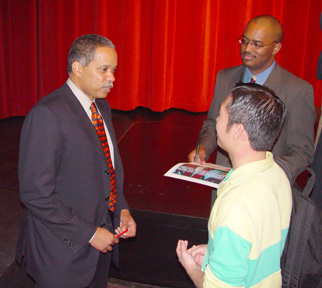 Juan Williams answers questions from Wabash students Johnny Warren and Benjamin Nguyen Tang Le following his talk Monday evening. |
Recalling the lives of Jackie Robinson, Nelson Mandela, and Thurgood Marshall, Juan Williams said, "so many young leaders didn't see themselves as leaders, nor did they see their capacity to bring about change."
Williams is the host of National Public Radio's "Talk of the Nation" program and a political analyst for the Fox News Channel, who for 23 years was a correspondent for The Washington Post.
Williams focused his comments on leadership and suggested that too many Americans shy away from leadership because they don't want to be in the spotlight.
"For you, the young men of Wabash College, the challenge of race will determine the future of this country," said Williams. "We must have racial stability. And nobody seems to see themselves as leaders in issues of race in American society."
Williams pointed out the difficulties of leadership based on the stereotypes that African Americans are seen as too obvious; whites know nothing of racial problems; and Hispanics are too new to the country to fully understand the problems.
"You as young people?the best of America?are privileged to be here, to learn; you have to have the heart of a fighter and understand that you are in a position to bring about social change."
Williams, who wrote the biography of Thurgood Marshall, the first African American Supreme Court Justice, recalled his early interviews with Marshall that would become the basis of his book. As an undergraduate at Lincoln University, Marshall had no ambition and was involved in fraternity pranks, but he was still a major voice on campus.
It wasn't until Langston Hughes inspired him?and when he first experienced racism?that Marshall began to see in himself leadership that could inspire change. He helped author a referendum that would bring the first African American teacher to Lincoln. Later, while attending Howard University for law school because he could not attend the University of Maryland in his home state, Marshall was mentored by law school dean Charles Hamilton Houston.
Houston told the young Marshall that a lawyer who is not a social architect is a social parasite.
The seeds of leadership had been sown.
After graduation, Marshall argued successfully in the case of Donald Murray in a suit brought against the University of Maryland, which at the time didn't accept students of color. That began a series of court victories in higher education that would eventually lead to the historic 1954 Brown v. Board of Education case, which ended segregation in schools.
"The first thing you have to do," Williams said to Wabash students "is to have a sense of yourself and the society in which you live."
That's a reality that Williams argues would disturb Marshall, a reality that includes increasing segregation in neighborhoods and schools.
"Young people in this country think they have a sense of race," said Williams. "And yet they have no sense of the incredible diversity in this country. Almost half the people under 21 in this country are people of color."
Williams believes that many people today don't see themselves as leaders because they don't see the issues as clearly. To successfully bring about change, he argues, means understanding the enormity of cultural change in this country. In the 1960s, the media kept civil rights issues in front of people. Today, he believes, immigration is the "great untold story of our time."
"Your life goal has to be about becoming an American leader; you have to get in the ring and fight. You have a chance to make a tremendous difference if you keep your eyes on the prize," he said, referring to the title of his best-selling civil rights book, Eyes on the Prize.
Williams closed by suggesting that to win, the fight first has to be fair and challenged Wabash students to focus their attention on insuring quality educational opportunities for all people.